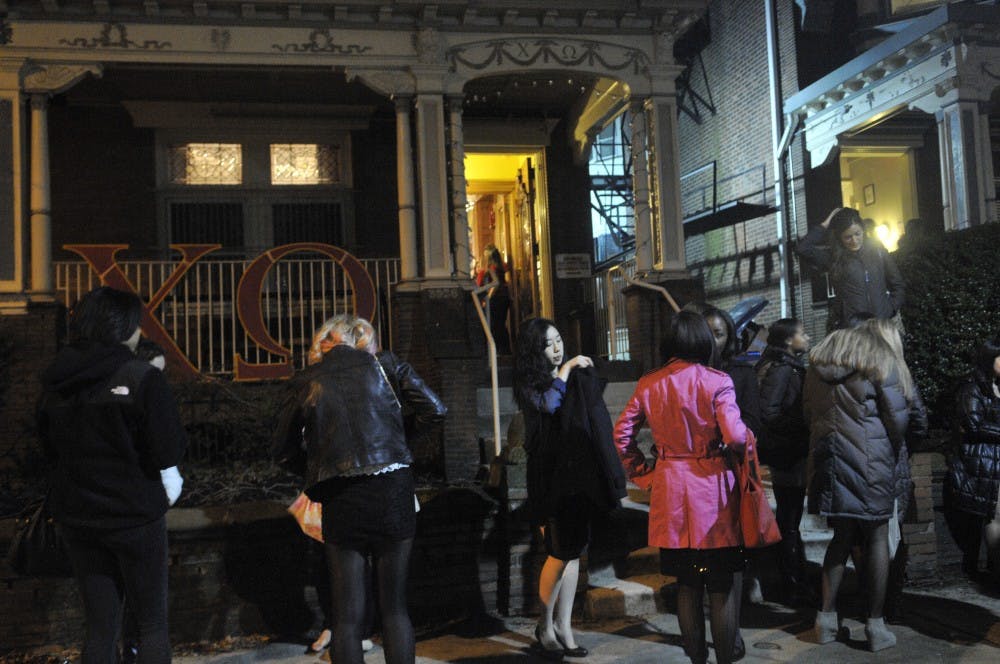
Leaders of both Greek and minority organizations have announced the formation of the Greek Community Judicial Board, a body that will hold Greek organizations accountable for issues regarding cultural insensitivity.
Last semester, Phi Delta Theta fraternity came under fire for a controversial Christmas card photo in which members of the fraternity were seen posing with a black sex doll. Many students felt as if there were no mechanisms for punishing the fraternity.
“What I saw directly in the aftermath of the Phi Delt situation was that there wasn’t something that could hold the Greek community accountable,” said Lambda Alliance chair and College senior Erich Kessel, whose organization participated in the construction of the judicial board. However, Kessell said he cannot comment on what originally sparked its creation.
The Interfraternity Council’s Judicial Inquiry Board manager, College junior Griffin Rubin, who helped facilitate the drafting of the new board, said the impetus for the GCJB did not come from a single place.
“While certain incidents over the past two years in the Greek community indicated that a change was necessary, speaking for the IFC, we also saw the creation of the GCJB as an opportunity to reaffirm the goals of fraternities to scholarship, philanthropy and brotherhood,” he said.
The board intends to serve as a medium for students to voice their complaints if members of the Greek community are culturally insensitive. It will be comprised of one chairperson and six members, with each of the three Greek councils holding two seats.
“There was no infrastructure nor system in place to deal with that kind of problem,” IFC Director and Wharton senior Jacob Wallenberg said. “I think that it is good for us to be prepared for the fact that there are cultural insensitivity issues.”
Once the board is approved by the university, a case could be brought to the attention of the board by a student and the board would deliberate on the particular case and issue sanctions on the accused Greek organization, if necessary, with the approval of the Office of Fraternity and Sorority Life.
Wallenberg believes that many of the previous incidents of cultural insensitivity have been the result of miseducation.
“I think some of them stem from misunderstandings more so than spite or malice, but I think it is important to have somewhere students can turn to with their concerns and say, ‘This is something that I find offensive, and this is something that I think needs to be addressed.’”
He hopes that potential sanctions will address this problem and avoid jeopardizing the charters of accused Greek organizations.
“I think punishments coming from an equal group ... makes the consequences a bit more effective,” Wallenberg said.
The board does not intend to meet on a regular basis and will only convene if and when demonstrations of cultural insensitivity within the Greek community are brought to its attention.
The board would represent a departure from old OFSL policy, which involves administrators putting sanctions on Greek organizations that violated their rules. UMOJA co-chair and College junior Ray Clark believes that having students run and draft the board will ensure its effectiveness.
“I can guarantee that this project will be effective because it came straight from the students. We got feedback and support from Greek Life, the 5B and the UA, and knowing that no stone was left unturned gives me a very positive outlook on how things will play out,” Clark said, adding that varying perspectives among students will contribute to the board’s success.
However, for Clark and other leaders of minority organizations, the council is not the only step toward fostering an accepting and safe culture on campus for minority students.
“I think this is one of the most important steps that can be taken to address the problems that have come up before in the Greek community,” Kessel said, though he added that there is a need for competency training as well.
“I think it’s imperative that we really continue dialogue about these issues. At the end of the day, a lot of people still don’t know why some of the things we have seen are wrong, and I understand that people have different opinions,” Clark said. “My point is that it’s about being respectful enough to one of your peers to recognize that their feelings are legitimate, no matter what your intentions were in the moment.”
Clarification: This article has been updated to reflect that the University currently holds that it has not approved the proposal for the board nor endorsed the specific details.
The Daily Pennsylvanian is an independent, student-run newspaper. Please consider making a donation to support the coverage that shapes the University. Your generosity ensures a future of strong journalism at Penn.
DonatePlease note All comments are eligible for publication in The Daily Pennsylvanian.








